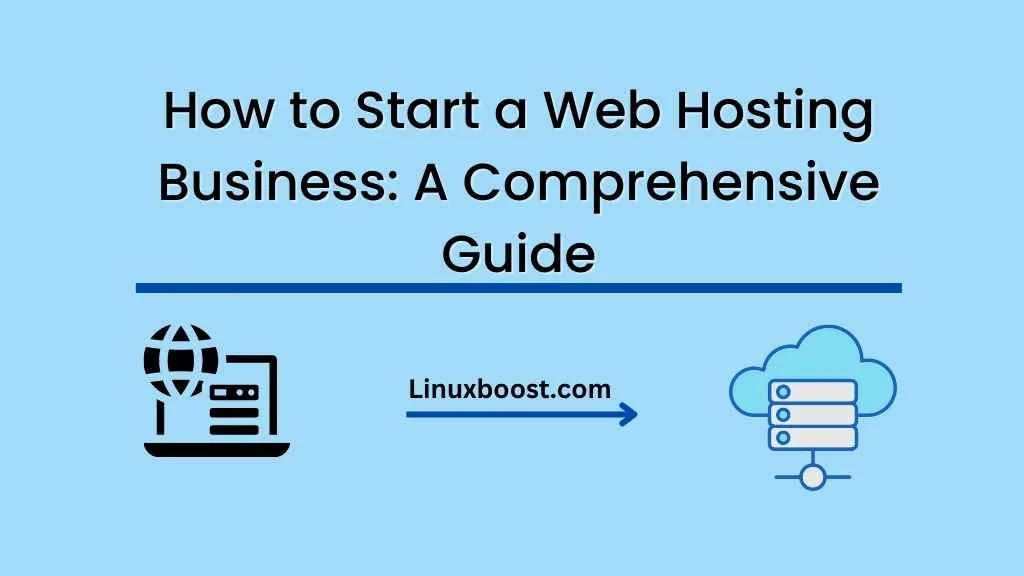How to Start a web hosting business can be a lucrative and rewarding endeavour. With the demand for web presence consistently growing, there has never been a better time to dive into this industry. In this blog post, we’ll guide you through starting your own web hosting business, focusing on essential aspects such as infrastructure, software, and marketing.
How to Start a Web Hosting Business.
Table of Contents
- Understanding the Web Hosting Industry
- Choosing Your Infrastructure
- Selecting the Right Software
- Creating a Strong Brand and Marketing Strategy
- Setting Up Customer Support and Billing Systems
- Final Thoughts
1. Understanding the Web Hosting Industry
Before starting a web hosting business, it’s crucial to understand the industry and its various niches. Familiarize yourself with the different types of hosting services such as:
- Shared Hosting
- VPS Hosting
- Dedicated Hosting
- Cloud Hosting
- Managed Hosting
As a newcomer, you may want to specialize in a specific niche or offer a mix of services. Researching the competition is essential. For instance, explore the offerings of leading companies like Goldenhost, and Layer Webhost
2. Choosing Your Infrastructure
The quality of your infrastructure directly affects your customers’ experience. When it comes to hardware, you have two main options:
- Leasing a dedicated server: Rent a server from a data centre, which will be responsible for maintaining the physical hardware.
- Co-location: Purchase your own server and rent space in a data centre, which will provide power, cooling, and security.
As you grow, you may consider building your own data centre. However, this requires significant upfront investment and expertise.
3. Selecting the Right Software
Choosing the right software is crucial for managing your hosting business. Here are the main software components you’ll need:
- Operating System: Linux and Windows are the most popular choices. Linux is open-source and widely used, such as Almalinux or CloudLinux while some clients may prefer Windows for its compatibility with Microsoft products.
- Control Panel: A user-friendly control panel like cPanel or Plesk is essential for managing hosting accounts.
- Server Management Software: Tools like WHMCS or HostBill can automate billing, support, and account provisioning.
4. Creating a Strong Brand and Marketing Strategy
Your brand and marketing strategy will set you apart from the competition. Consider the following steps:
- Develop a unique and memorable brand name and logo.
- Design an attractive and user-friendly website that showcases your services.
- Creating engaging content, such as blog posts and tutorials to boost your SEO efforts.
- Utilize social media platforms to build an online presence and engage with potential customers.
- Offer competitive pricing and promotions to attract new clients.
- Leverage Google Ads and Facebook Ads for targeted advertising campaigns.
- Establish partnerships with complementary businesses, such as web designers, developers, and digital marketing agencies.
- Encourage customer reviews and testimonials to build trust and credibility.
- Participate in relevant industry forums and online communities to increase brand awareness and establish your expertise.
5. Setting Up Customer Support and Billing Systems
Exceptional customer support is crucial for retaining clients and maintaining a positive reputation. Consider implementing the following:
- A ticketing system to handle support requests efficiently.
- Live chat support for immediate assistance.
- A comprehensive knowledge base with articles, FAQs, and tutorials.
- Regularly monitor and respond to client feedback on social media and review platforms.
Billing systems are equally important for managing client payments and subscriptions. Some essential features to consider include:
- Integration with popular payment gateways like PayPal and Stripe.
- Automated invoicing and payment reminders.
- Support for multiple currencies and tax rates.
- Customizable pricing plans and discounts.
6. Final Thoughts
Starting a web hosting business can be a challenging yet fulfilling venture. By focusing on the quality of your infrastructure, choosing the right software, developing a strong brand and marketing strategy, and offering excellent customer support and billing systems, you’ll be well on your way to success in this competitive industry.
Remember, learning is a continuous process. Stay informed about industry trends and best practices, and be prepared to adapt your business to meet the changing needs of your customers. With dedication, persistence, and a customer-centric approach, your web hosting company is poised to thrive.





